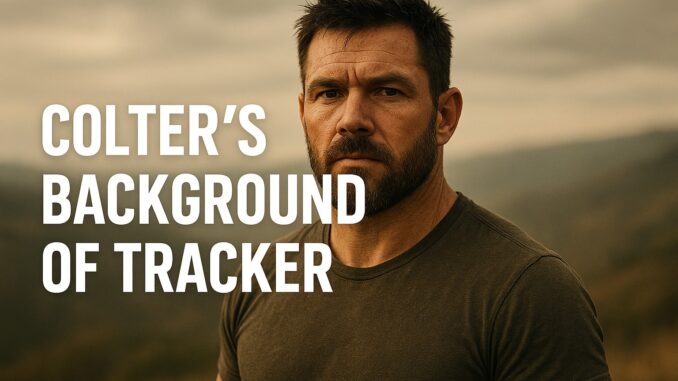
The Power of a Difficult Beginning
Every story starts somewhere, but for Colter, his began in a place far from comfort. His childhood wasn’t picture-perfect — it was raw, unpredictable, and full of lessons that no classroom could teach. Yet, those very experiences molded him into the man he is today. His mindset, his actions, even his silent moments — all trace back to that defining early period.
In this deep dive, we’ll explore how Colter’s background, upbringing, and early struggles sculpted his worldview and the way he navigates life today.
A Glimpse Into Colter’s Early Life
Growing Up Tough
Colter didn’t grow up with silver spoons or safety nets. His childhood was marked by challenges — financial struggles, personal loss, and the constant need to fend for himself. While most kids were busy playing, Colter was learning survival.
That environment, though harsh, became his first teacher. It taught him discipline, resilience, and self-reliance — traits that now define his adult life.
Lessons Learned Early
Instead of breaking him, the hardships became stepping stones. Every obstacle was a lesson in disguise. Colter learned to solve problems, to adapt, and to trust his instincts — something that would later become a trademark of his decision-making.
The Emotional Blueprint of His Character
Building Emotional Armor
When you grow up in uncertainty, you develop an emotional shield. Colter became emotionally resilient — not by choice, but by necessity. He learned to suppress fear, manage pain, and face reality head-on.
The Power of Empathy
Yet, beneath that tough exterior, there’s empathy. Because Colter knew what it felt like to struggle, he grew into a man who could understand others’ pain. That’s what makes him both strong and deeply human.
How His Childhood Shapes His Actions Today
Relentless Work Ethic
Colter’s tireless drive isn’t random — it’s rooted in his past. Growing up with limited opportunities made him value every chance he got. He works like someone who’s still proving himself, even when he’s already won.
Decision-Making Under Pressure
As a child, Colter often had to make quick decisions with lasting consequences. That early exposure to responsibility trained him to stay calm under pressure — a skill that now defines his leadership style.
The Influence of Family and Environment
A Mother’s Quiet Strength
Behind every strong man, there’s often a stronger woman. Colter’s mother was his anchor — the one who taught him kindness amidst chaos. Her sacrifices became the emotional compass that still guides him.
The Absence of Privilege
Colter’s upbringing wasn’t privileged — and that became his advantage. Without comfort to rely on, he had to rely on himself. That self-dependence became his greatest asset.
Adapting to the World Around Him
Learning the Art of Adaptability
Growing up in an unpredictable environment taught Colter one essential survival skill — adaptability. Whether it’s a new challenge or a sudden change, he adjusts quickly and effectively.
Turning Obstacles Into Opportunities
Colter doesn’t see problems — he sees puzzles. His ability to turn setbacks into stepping stones stems directly from his early life’s unpredictability.
His View on Relationships and Trust
Guarded Yet Loyal
Because of his upbringing, Colter doesn’t trust easily. But once he does, he’s unwaveringly loyal. His friendships are few but deep, built on mutual respect rather than convenience.
Protecting What Matters Most
Colter’s childhood taught him the fragility of stability. That’s why he protects what he values — family, honor, and loyalty — with unwavering intensity.
The Psychological Impact of His Past
Strength Born From Scarcity
When you’ve had to fight for every inch, you develop mental fortitude. Colter’s scarcity mindset turned into a strength — he never takes success for granted.
The Weight of Responsibility
Even as a child, Colter carried burdens beyond his years. That sense of duty didn’t fade; it evolved. Today, it manifests in how seriously he takes every task and every person who depends on him.
How He Approaches Success and Failure
Success Is Earned, Not Given
For Colter, success isn’t about luck or timing. It’s about persistence. Every victory is personal — a reminder of how far he’s come.
Failure as a Teacher
While others fear failure, Colter embraces it. To him, every setback is a silent mentor whispering lessons about humility, patience, and growth.
The Moral Compass Shaped by His Youth
Integrity Above All
Colter’s childhood wasn’t just about survival — it was about choices. He learned that doing the right thing, even when it’s hard, defines a person more than any success ever could.
Standing His Ground
He doesn’t bend to trends or peer pressure. That unshakable sense of self comes from years of having to stand alone — and stand tall.
His Leadership and Influence
Leading by Example
Colter doesn’t just tell people what to do — he shows them. His leadership style mirrors the lessons of his youth: work hard, stay humble, and never quit.
Inspiring Through Authenticity
People follow Colter because he’s real. His transparency and honesty stem from a childhood where pretenses had no place.
The Legacy of His Upbringing
A Man Molded by Memories
Colter carries his past like a tattoo — visible to those who look closely. Every action, every decision, every word he speaks echoes the boy he once was.

Turning Pain Into Purpose
Instead of letting his past define him negatively, Colter uses it as fuel. His life’s mission isn’t to forget where he came from — but to prove how far he can go.
Conclusion: The Child Who Became the Man
Colter’s story is proof that our beginnings don’t dictate our endings. His background — full of challenges, pain, and lessons — became the foundation for the man he is today. Every trait, every action, every success he achieves is a reflection of a boy who refused to let his past hold him back.
He turned hardship into heart, pain into purpose, and struggle into strength. That’s Colter — shaped by his childhood, defined by his resilience.
FAQs
1. What aspects of Colter’s childhood influenced his character the most?
His resilience and empathy were deeply influenced by early struggles and the need to adapt to hardship.
2. How does Colter’s past affect his relationships today?
It makes him cautious with trust but fiercely loyal once he lets someone in.
3. Why is Colter’s work ethic so strong?
Because he grew up without guarantees — he learned early that nothing comes without effort.
4. How does Colter handle challenges now?
He approaches them calmly and strategically, drawing on years of navigating difficult situations as a child.
5. What can we learn from Colter’s story?
That adversity isn’t a dead end — it’s the training ground for greatness.